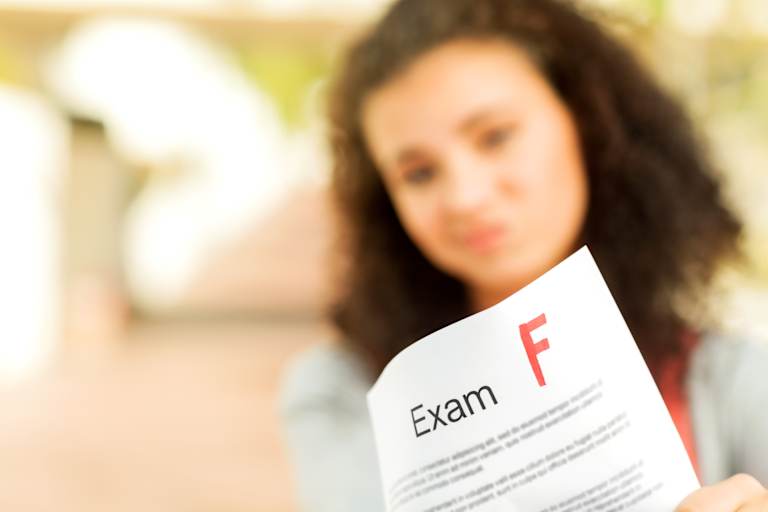How to Bounce Back From a Poor Midterm Grade
- Midterm grades provide a snapshot of your academic performance in a class.
- A poor midterm grade doesn’t define you, but it can be a wake-up call.
- Your professor, your teaching assistant, and others can offer assistance.
- An academic advisor may be able to help you improve your study habits.
You didn’t do as well on your college midterms as you’d hoped. Maybe the midterm exam content didn’t exactly match what you studied. Maybe you didn’t stick to your study schedule as well as you thought you did.
Either way, you’re disappointed. You didn’t perform as well as you expected.
However, with the right attitude, a bad grade can be a wake-up call to do better. You can bounce back from a poor midterm grade by taking advantage of a few strategies and tips.
What Are Midterms and Why Are They Important?
Midterm grades provide a snapshot of your academic performance in a particular course. This is all it is — an update of how you’re doing in a class. It’s a good indicator of your standing so far.
Remember that no matter the outcome of your midterm, you are much more than a grade on a test. Try not to be too hard on yourself.
At the same time, don’t simply shove your midterm paper or exam in your folder and call it a day. Make this an opportunity to learn and take steps to bounce back from a poor grade.
4 Tips for Bouncing Back After a Disappointing Midterm
There are several ways to recover from a midterm grade that wasn’t so great. Reflect on your grade, ask your professor for help, find others who can give you advice and support, and invest time in improving your study skills.
1. Reflect on Your Grade and the Exam
As far as the content is concerned, what did you do well? Think about the topics and concepts you understood.
On the flip side, what did you not know as well? Which areas need refinement and better understanding? What are you still confused about or not understanding? Are there any themes or areas that you are unsure about or still have questions about after reviewing the content of the exam or paper?
After reflecting on the midterm, examine your study habits and strategies. Ask yourself these questions:
- Did I give myself enough time to study the depth and breadth of the course material?
- Did I wait until the last minute to study?
- Did I study in small, meaningful increments?
- Did I really study the material? Or was I just going through the motions? (For example, did I study the material without distractions, or did I spend a good chunk of my “study” time scrolling through Instagram instead?)
- Did I create any useful study materials?
- Do I need to make any changes to my study strategies? How can I improve my study skills?
2. Consult Your Professor
Your professor is there to help you! Send your professor an email or consult them during their office hours. Professors want you to succeed in their classes, so work with them on a plan that benefits you.
Professors can help you understand what to go over and how to study for an exam, as well as how to improve your assignments. They can cover specific questions on tests or assignments, review content, and help you get caught up.
When reaching out to your professor, be respectful. Also, take responsibility for things like assignments you haven’t turned in, classes you missed, or being behind on assigned readings.
Make sure to include the following in your email to your professor:
- Your name
- The class you’re enrolled in
- The grade you received
- Your plan to work to improve your grade in that course
- Questions asking what you can do to improve your grade
- Times when you are available to meet and discuss your grade so far
Below is an example of an email to a professor discussing grades:
Dear Professor Smith,
My name is Allie, and I am in your 9 a.m. intro to economics class. I noticed that in your class, I’m earning a C+
Thank you for your help!
Sincerely,
Allie Yamaguchi
3. Get Help From Others
Besides your professor, there are other people available to help you with a course. Don’t be afraid to connect with them. Here are a few individuals to consider:
- Teaching Assistants (TAs): A TA is a current student who has already completed the course and assists with teaching. This person, who likely has in-depth knowledge of the course material, may be able to help you through things like post-class chats and review sessions.
- Classmates: Is there a study group in your class? If not, get a group together to review the material. Learn from one another, and build on everyone’s ideas. Together, you can create study guides, materials, and flashcards. The key is to use the time to actually study — not binge on Netflix.
- Tutoring Services: Most colleges and universities offer tutoring programs for specific majors and departments. Check with your school’s tutoring services. If tutoring services are not available for a specific class, consider meeting with an upper-level student who did well and already took the course. See if that person can offer any tips.
4. Improve Your Study Skills
If you need assistance refining your study skills, your academic advisor can help. Some study strategies you may want to consider include the following:
- Review past quizzes
- Write your notes in an outline format
- Review notes after class
- Read the text and provide annotations
- Ask questions during class
- Break down large assignments into several mini assignments and make a plan to get them done
- Schedule time in your day between classes or in the evening to study in brief spurts
- Get a study group together
Your academic advisor can also tell you about any policies and information regarding withdrawing from a class. However, carefully consider the pros and cons before dropping a class. Your academic advisor should be included in that decision-making process.
Remember, midterm grades do not define you. They are merely an indicator of how you’re doing in a particular class. You can always improve. Just be sure to ask for help when you need it.




